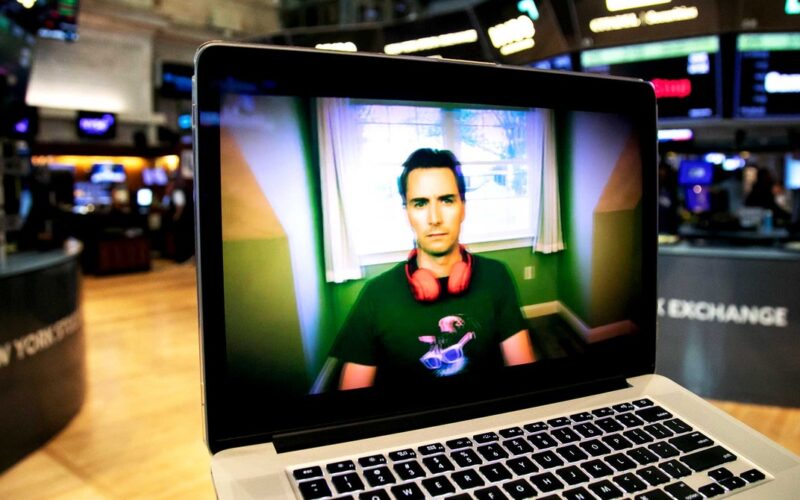Gill did not face charges then, but this time could be different. The securities regulator for the state of Massachusetts has confirmed it is looking into Gill’s recent conduct, without providing specifics. It would appear that Gill is aware of the risk of provoking an SEC investigation. On May 16 he posted a clip of a CNBC interview in which Jay Clayton, former SEC chair, expressed the view that his conduct should not be tolerated. The SEC declined to comment on the existence of an investigation.
At the start of Gill’s YouTube livestream, a long disclaimer scrolled up the screen like the Star Wars opening crawl. “You should not treat any opinion expressed on this Youtube [sic] channel as a specific inducement to make a particular investment or follow a particular strategy,” it read. As Gill bantered with his YouTube viewers—all 600,000 of them—the price of GameStop stock briefly rose. “Shit, look at this. It’s going up,” he said. “Do I have to be careful what I say here? I don’t really know.”
It might seem self-evident that Gill’s posts, cryptic as they may be, have caused a rise in the price of GameStop stock from which he stands to profit, as a stockholder. But absent a full history of his trading, it is difficult to assess whether he has violated securities laws, says Richard Schulman, partner at law firm Adler & Stachenfeld. “It’s never entirely clear until the facts are fully formed,” he says.
But Gill has given regulators plenty to dig into. “Was his purpose to influence the movement of stock price? Did he, in fact, affect demand for the stock? Will he profit from these activities? These are the kinds of issues a regulator will want to investigate,” says Schulman. The answers could determine whether Gill faces a formal investigation.
Specifically, Gill could find himself in trouble when his call options expire on June 21, leaving him with a decision: Should he sell his options at a profit, if the stock price remains high, or take delivery of the GameStop shares they represent? Having made his position public, says Bragança, Gill is required under a little-understood facet of securities law to provide his audience with advance warning of any sales, even if doing so would jeopardize profits. “The problem is when you change your position,” says Bragança. “Before you sell, you’d better tell the marketplace. Most people on social media don’t think that way. The initial [social] posts are not the thing that is going to get him in trouble—it’s the stuff we can’t see.”
Gill may question how his conduct differs from any other pundit who offers stock tips or chief executive who talks up their company. And he could have a point. There is an extent to which Gill is flirting with gray areas in the securities rulebook, devised long before someone imagined an influencer in a position to swing the market with a single tweet.
But the SEC has typically contended that the rules are sufficiently malleable to allow for mutations of age-old violations to be dealt with. “Market manipulation is not necessarily a rigid concept,” says Schulman. “The SEC is not unused to trying to apply concepts to new situations in the world that has developed.”
The SEC has not made public its thinking, but former chair Clayton, in the interview with CNBC, implied that the agency will be eager to prevent further volatility in the price of GameStop, which risks imposing large-scale losses on investors. One way to do that would be to bring cases against an individual that it considers has wielded social influence in an illegal way, with the aim of deterring others from doing the same. “It’s like Aesop’s fables,” says Bragança. “We’re telling a story. You should take a moral from it.”
Source link
lol

